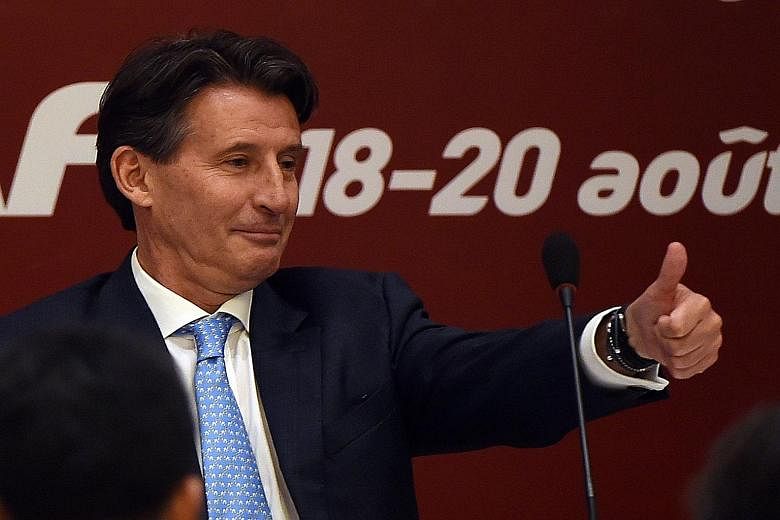LONDON • On Sunday, Sebastian Coe, the new International Association of Athletics Federations (IAAF) president, will sit in the Bird's Nest Stadium in Beijing and may face the unedifying prospect of having to applaud a two-time drug cheat as the new 100 metres world champion.
Usain Bolt might prevent that, of course, but the second coming of Justin Gatlin, whom many believe should have long been kicked out of the sport, will sit uneasily with Coe.
"I'd be lying if I said it wouldn't be a little queasy," he told The Times of the scenario when out on the campaign trail. "I'm pretty unreconstructed on this. I won't bend a knee to anyone."
While the Gatlin scenario highlights the problem of having to police and promote a sport, the president's stiff-kneed stance is good news. Bolt has previously been credited as the saviour of track and field but it might actually be Coe if he can change things.
The 58-year-old loves athletics enough to know that it is in the throes of its biggest crisis.
He says the current calendar is unsustainable and that the sport is poorly marketed but such things require a foundation of credibility.
Athletics' credibility is almost shot. Go to the IAAF's website and you will find more than 300 names of banned athletes.
Last year, ARD, a German broadcaster, screened a documentary in which a Russian coach said 99 per cent of Russian Olympians are dopers. The IAAF said it was investigating but little has happened in the intervening nine months.
That is a hell of a pregnant pause when your sport is dying.
Since the Russian allegations, the BBC has made serious claims about Alberto Salazar, coach of Mo Farah and long-term friend of Coe.
Britain's Sunday Times and ARD have also claimed that the IAAF tried to suppress a study that revealed around a third of athletes at the 2011 World Championships had infringed anti-doping rules in the preceding 12 months.
It is not enough for the IAAF to claim it tests more than most sports and that the scores of positive tests prove the system is working.
It needs to do far more because it is on its last legs.
Coe surely has the will. He favours life bans for dopers while knowing that is unfeasible in an era of expensive lawyers. And he knows this year has been the annus horribilis, surpassing even the Ben Johnson and Balco scandals.
Coe will now set up an independent body to conduct drug-testing.
He may also take a harder line on national federations reducing sanctions for athletes if they provide information. Gatlin's eight-year ban was halved for that reason.
"When I sit there and listen to athletes say it was anti-ageing cream, the dog-ate-my-homework excuses, I am instinctively nervous. I'd want to be clear about the quality of the information," he has said.
Coe knows how hard it is to solve an image problem from his time working on Fifa's ethics commission. In addition, his victory was not a landslide, with 42 per cent of voters opting for Sergey Bubka, the Ukrainian pole-vault legend.
He will hope the Bubka lobby get behind him and his radical plans.
If suspicion is killing the sport, it has plenty of other ailments too.
Coe comes from a golden era of packed-out stadia and household names. Bolt has only one more Olympics and then the sport must find a new hero. Somehow, Coe needs to apply a sporting narrative to a dislocated season.
At the moment, the best athletes in the world rarely run against each other outside of major championships. Coe is contemplating central contracts and even a version of cricket's Indian Premier League to solve that and rouse interest.
"This will send a shudder through the traditionalists, but I'd like a team-based concept where, for a few weeks, athletes go into an auction and compete for the big five cities," he said.
Coe says athletics lost its way in the 1990s and failed to capitalise on the godsend of Bolt. He wants to get the best athletes to the big media cities like London and New York when they achieve the remarkable.
The trouble is, who will want to champion incredible achievements if they do not believe them?
The credibility chasm is now a canyon. If Coe can bridge it, then it will be a feat to top all of his Olympic medals and world records.
THE TIMES, LONDON

